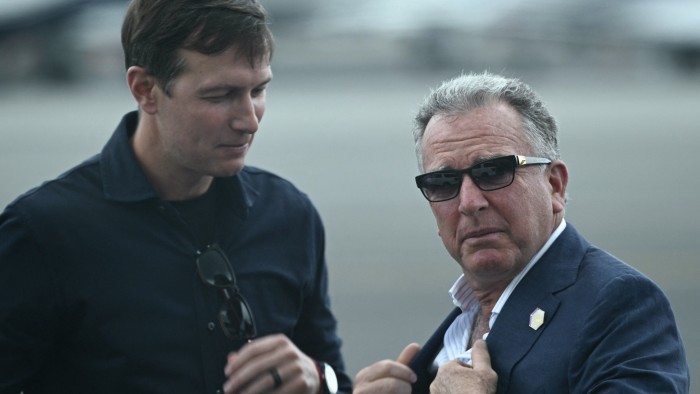Unlock the Editor’s Digest for free
Roula Khalaf, Editor of the FT, selects her favourite stories in this weekly newsletter.
Senior negotiators from the US, Qatar and Turkey were set to join talks to end the war in Gaza as mediators increased pressure on Israel and Hamas to resolve differences over Donald Trump’s plan for a ceasefire and the release of hostages.
Qatar, one of the lead mediators, said the talks had reached a “critical stage” as it announced Sheikh Mohammed bin Abdulrahman al-Thani, the Gulf state’s prime minister, would join the negotiations on Wednesday.
US envoy Steve Witkoff and Jared Kushner, the US president’s son-in-law who has been involved in drafting the plan, were also due to attend the talks in Sharm el-Sheikh, according to Egypt’s foreign minister and state-linked media.
An Israeli official said Prime Minister Benjamin Netanyahu dispatched Ron Dermer, one of his closest aides and his top negotiator, to Egypt. Turkey, which like Qatar hosts Hamas’s political officials, was sending its intelligence chief Ibrahim Kalin, according to state media.
Despite both Israel and Hamas saying they broadly supported Trump’s 20-point plan, there are key points of contention between the warring parties.
This includes Hamas’s concerns over the demand that it be disarmed, the framework for Israel’s gradual withdrawal from the strip and the role of an international stabilisation force that is supposed to be deployed in the enclave, said a diplomat briefed on the talks.
The diplomat said there had been progress, adding that the aim of the discussions was “to iron out the remaining details and establish a mechanism of implementation for all parties to agree on”.
But the diplomat added that Arab states were concerned that Netanyahu had amended parts of Trump’s plan, which was first presented to Arab and Muslim leaders on the sidelines of the UN General Assembly last month.
This included details of the timeline and locations of the Israeli troop redeployment, and diluting references to the Palestinian Authority, which administers limited parts of the occupied West Bank, the diplomat said.
Arab states wanted the western-backed PA to have a greater involvement in the transitional arrangements for Gaza, believing it to be key to the transition’s legitimacy, while Netanyahu has repeatedly rejected any role for the authority.
“The Arab countries point is the way the deal was edited by Netanyahu, Hamas will never accept it,” the diplomat said. “We are back to discussing details to bring it slightly back to something more realistically acceptable for both sides.”
Hamas has said it is willing to release the remaining 48 hostages — 20 of whom are believed to be alive — and that it accepts that it will give up control of Gaza, which it has ruled since 2007. Under the US plan, the strip would be governed by a committee of Palestinian technocrats, overseen by an international supervisory body led by Trump.
But Hamas has made little reference to others points in the proposal.
Khalil al-Hayya, Hamas’s top negotiator, reflected the group’s caution around the deal by referencing Israel’s decision to break a US-brokered ceasefire and hostage exchange deal in March.
“We were negotiating but Israel returned to war . . . the Israeli occupation throughout history did not comply with its promises,” Hayya, who was the target of an Israeli missile strike on Hamas’s office in Doha, told Egypt’s Al-Qahera television. “Therefore, we need real guarantees from the international community.”
A western diplomat said Hamas was “not entirely convinced that this deal is the best thing”.
“They will need actual guarantees since they’ve already been burnt once or twice. The Arabs have to step up . . . and get the US to provide those guarantees,” a western diplomat said.
Israel wants to keep the focus of the talks on the first phase of Trump’s plan, which centres around the hostage release, and not the longer-term provisions, said a person familiar with the Israeli government’s thinking.
In exchange for Hamas freeing the hostages, Israel would release 250 Palestinian prisoners serving life sentences, as well as 1,700 Gazans detained after the militant group’s October 7 2023 attack that triggered the war.
The potential release of high-profile Palestinian figures that Israel has convicted of acts of terrorism, such as Marwan Barghouti, is expected to be hotly contested by the Israeli negotiating team and face a backlash within Netanyahu’s far-right coalition.
Hamas has pushed for the release of Barghouti, a member of its rival Fatah faction, and considered the most popular Palestinian leader despite having spent the past two decades in an Israeli prison.
Hamas said it handed over a list of prisoners it wanted released in exchange for hostages, but did not name them.
Read the full article here
